I read a lot of good, inspirational, thoughtful and devotional work this year, but these were the ones that stuck out in my mind. I’d encourage the careful reading of all of them.
(in alphabetical order by author)
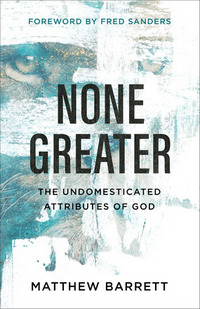 None Greater: The Undomesticated Attributes of God
None Greater: The Undomesticated Attributes of God
by Matthew Barrett
I haven’t had a chance to write about this book yet, but it’s great. Barrett provides a wonderful tool to introduce believers of all ages/background to the main attributes of God to shape belief and practice. It’s a corrective, but not scoldy. It’s deep, but not hard to understand. It appreciates mystery and doesn’t try to overexplain anything but it also grapples with what we’re given to understand. I’ll say more in a week or two, but for now, just know it’s one of the best things I read last year.


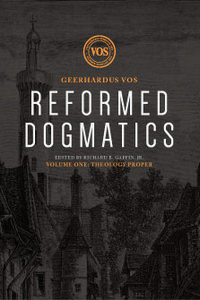 Reformed Dogmatics, Volume 1: Theology Proper
Reformed Dogmatics, Volume 1: Theology Proper
by Geerhardus Vos, Richard B. Gaffin, Jr. (Translator and Editor)
My original post
Yeah, it’s only a picture of one of the volumes (but they all pretty much look alike). This set concisely, yet comprehensively, discusses the major theological loci in a way that’s scholarly and yet warm and practical.


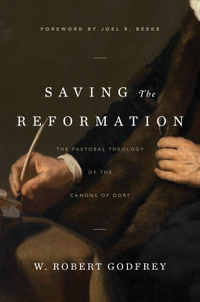 Saving the Reformation: The Pastoral Theology of the Canons of Dort
Saving the Reformation: The Pastoral Theology of the Canons of Dort
My original post
This look at the Synod of Dort, as well as the Canons produced by it, is well-researched, careful, encouraging and pastoral—this is not dry and dusty history, nor dry and dusty doctrine. This book, like the Synod it focuses on, seeks to defend, protect and further the cause of the Protestant Reformation, the Gospel itself. As such, it succeeds and you’d do well to study it.


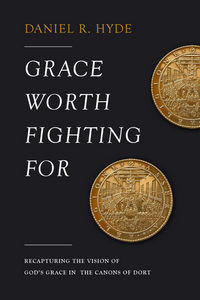 Grace Worth Fighting For: Recapturing the Vision of God’s Grace in the Canons of Dort
Grace Worth Fighting For: Recapturing the Vision of God’s Grace in the Canons of Dort
My original post
Is a fantastic companion to the previous book. Hyde focuses on the Canons themselves and what they’re getting at, showing how Church History developed those ideas to this point and how the Reformed church built on them. I didn’t expect anything to beat the Godfrey volume in this year where we got multiple books (thanks to the Canons’s anniversary), but this one did. it’s warm, pastoral and approachable. Anyone over 13 should have no problem with it. Sure, some of the topics will leave some scratching their heads and pondering for a while, but that’s because these are weighty, thought-provoking topics, not because of Hyde’s text. I may have read a better theological book this year, but I can’t think of it off the top of my head. This is simply excellent—rich theology, rich application, solid history, smartly writing, occasionally stirring.


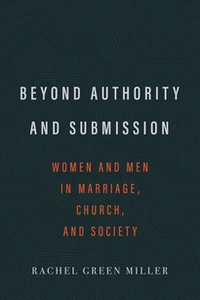 Beyond Authority and Submission: Women and Men in Marriage, Church, and Society
Beyond Authority and Submission: Women and Men in Marriage, Church, and Society
My original post
This book made me re-examine a lot—and will probably continue to do so as I mull on what she has to say (and I’ll probably find a lot to disagree with ultimately, and a lot to agree with—as it ought to be). How much of what I think about how women and men should interact with each other (in the home, Church and society) comes from Scripture and how much from the culture? How much of what I think it means to be a man or what it means to be a woman has more to do with Ancient Greek culture or the Victorians? (more than it should). The core of the message should be heard and weighed, and hopefully, after the hubbub around its publication has died down a bit, we can start to deal with it.


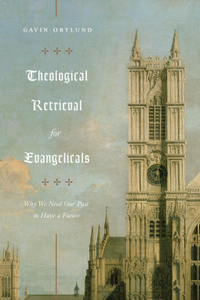 Theological Retrieval for Evangelicals: Why We Need Our Past to Have a Future
Theological Retrieval for Evangelicals: Why We Need Our Past to Have a Future
My original post
A fantastic mix of theory and practice—showing why and how Evangelicals should mine the treasures of the past to shape the theology of today and tomorrow.


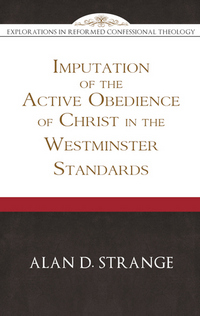 The Imputation of the Active Obedience of Christ in the Westminster Standards
The Imputation of the Active Obedience of Christ in the Westminster Standards
I was sure I’d written a post about this book, and was embarrassed to discover that I hadn’t—I somehow let this not be included in the November Retrospective, too. This is why I don’t get paid for this blog, folks.
Anyway, Strange packs a lot into this 176 page tome. It is dense. But somehow, it’s also an easy read. He explores the historical debate—particularly around the Westminster Assembly—around this doctrine and explains why the Standards express things the way they do. Then he applies it to contemporary debate in a straightforward manner. Pound for pound, possibly the most helpful book I’ve read this year.


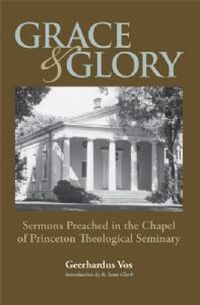 Grace and Glory: Sermons Preached in the Chapel of Princeton Theological Seminary
Grace and Glory: Sermons Preached in the Chapel of Princeton Theological Seminary
My original post
This is exactly what a collection of sermons ought to be—the language is clear, precise and almost lyrical. You can almost hear them as you read them. Solid theology, warm application and gospel-centered. My only problem with this collection is that it was so short.

Books that almost made the list (links to my original posts for those I wrote about): The Future of Everything: Essential Truths about the End Times by Willaim Boekestein, The Whole Armor of God: How Christ’s Victory Strengthens Us for Spiritual Warfare by Iain M. Duguid, Rediscovering the Holy Spirit: God’s Perfecting Presence in Creation, Redemption, and Everyday Life by Michael S. Horton, The Prayers of Jesus by Mark Jones, and Baptism: Answers to Common Questions by Guy M. Richard.
![]()


